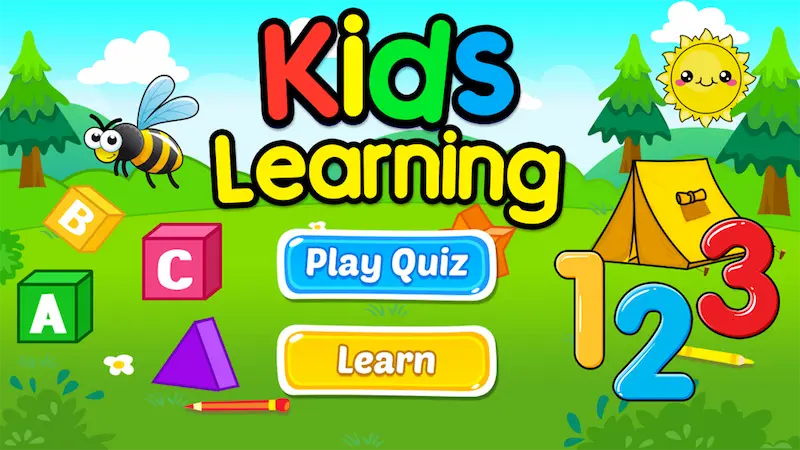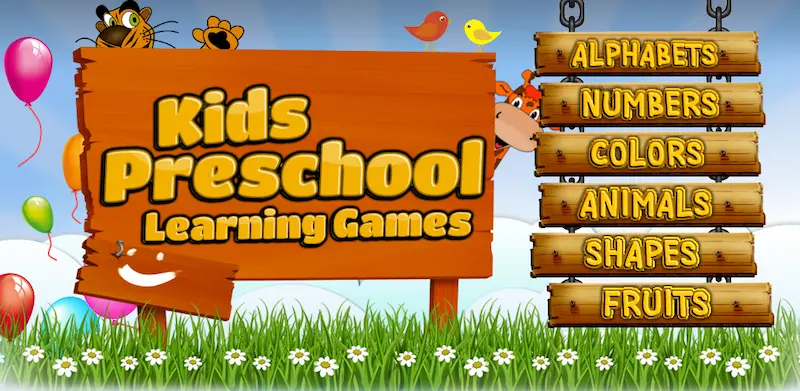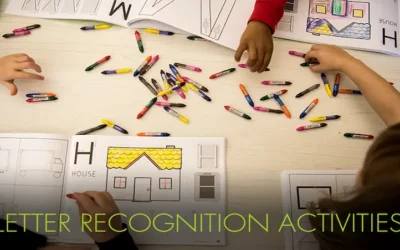In the realm of early childhood education, interactive learning holds immense significance. The utilization of technology and games in preschool education has transformed how children engage with learning materials, making the process more enjoyable and effective. These tools not only cater to diverse learning strategies and styles but also foster curiosity and a love for learning in young minds.
Table of contents
- Criteria for Selecting Preschool Learning Games
- 1: Alphabet Adventures
- 2: Math Marvels
- 3: Shape Safari
- 4: Color Quest
- 5: Word Wonderland
- Benefits of Preschool Learning Games
- Ensuring Online Safety
- Balancing Screen Time
- Parental Involvement
- Incorporating Games into Preschool Curriculum
- Conclusion
- Frequently Asked Questions (FAQ’S)
Criteria for Selecting Preschool Learning Games
Age-Appropriate Content and Engagement: The importance of aligning games with the developmental stage of children cannot be overstated. Understanding the cognitive abilities and interests of preschoolers is pivotal in crafting games that both captivate and educate. Engaging gameplay that keeps kids excited and motivated is achieved through interactive features and challenges tailored to their developmental milestones.
Learning Objectives and Skill Development: Games that target specific learning outcomes like literacy, numeracy, and cognitive skills are instrumental in laying a strong foundation for a child’s education. The deliberate design of these games encourages skill progression and scaffold learning for preschoolers, ensuring a gradual and effective learning curve.
Safety and Parental Controls: Implementing safety measures to ensure a secure online environment for kids include make them aware about online safety tips for kids is paramount. Robust parental controls play a crucial role in monitoring and regulating gameplay, allowing parents to manage content accessibility and screen time effectively.

1: Alphabet Adventures
Description: A captivating game focusing on letter recognition and phonics.
Age Suitability: Designed for preschoolers to aid in early language development.
Additional Sentence: The game features interactive exercises, catchy tunes, and colorful visuals that make learning the alphabet an exciting adventure for young learners.
2: Math Marvels
Overview: An interactive game emphasizing mathematical concepts and numeracy skills.
Age Recommendations: Tailored for preschoolers with engaging interactive elements.
Additional Sentence: Math Marvels incorporates fun activities, such as counting games and basic arithmetic challenges, providing an immersive learning experience while reinforcing fundamental math concepts.
3: Shape Safari
Introduction: An adventure-filled game exploring shapes and spatial awareness.
Age-Appropriate Content: Engaging visuals suitable for preschool-aged children.
Additional Sentence: Shape Safari includes interactive puzzles and quests that encourage children to identify and distinguish various shapes, fostering spatial cognition in an entertaining manner.
4: Color Quest
Features: A colorful game centered on learning about colors and recognition.
Age Suitability: Interactive activities designed for preschoolers.
Additional Sentence: Through vibrant games and activities, Color Quest not only teaches color recognition but also enhances visual discrimination skills, making learning about colors an enjoyable experience.
5: Word Wonderland
Description: A game fostering vocabulary building and early reading skills.
Suitable Age Ranges: Options available for various preschool age groups.
Additional Sentence: Word Wonderland offers a range of word-based challenges and activities, promoting language development and literacy skills among children at different proficiency levels.
Benefits of Preschool Learning Games
Cognitive Development and Academic Readiness
These games stimulate cognitive skills crucial for future academic achievement. They prepare children with a strong foundation for learning.
Preschool learning games not only stimulate cognitive development but also equip children with essential skills like attention, memory, and logical reasoning, laying a solid groundwork for their academic journey.
Enhancing Critical Skills for Future Learning
Games enhance problem-solving, creativity, and critical thinking, contributing to a child’s overall development.
By encouraging exploration, experimentation, and decision-making within game scenarios, develop problem-solving abilities, creativity, and critical thinking skills for kids that extend beyond gaming environments, positively impacting their holistic development.
Balancing Fun and Education in the Preschool Years
Integrating learning with enjoyment is crucial for optimal development.
Balancing fun and education is crucial during the formative years, as it not only sustains children’s interest in learning but also ensures a well-rounded development by integrating playful activities with educational content effectively.
Ensuring Online Safety
Tips for Safeguarding Preschoolers’ Online Experiences
Implement strict parental style and filters to ensure a safe online environment. Educate children about online safety practices from an early age.
Establishing a safe online environment involves educating children about internet safety practices, teaching them to identify trustworthy content, and fostering open communication with parents regarding their online experiences.
The Role of Parental Controls and Supervision
Utilize parental controls effectively to regulate access and screen time. Active parental supervision during gameplay is significant.
Parental controls serve as a crucial tool in managing children’s online activities, while active supervision allows parents to guide and support their children’s gaming experiences, ensuring both safety and positive engagement.
Balancing Screen Time
Guidelines for Appropriate Screen Time for Young Children
Set limits on screen time based on age and developmental stage. Encourage a balanced routine including outdoor activities and other forms of play.
Encouraging a balanced routine that includes outdoor activities for kids, social interactions, and varied forms of play alongside screen time helps in maintaining a healthy lifestyle for preschoolers, promoting their overall well-being.
Parental Involvement
How Parents Can Actively Participate in Their Child’s Learning Through Games
Engage with children during gameplay to maximize learning outcomes. The value of parent-child interactions in reinforcing educational experiences.
Parental involvement during gameplay not only enhances the learning experience but also strengthens the bond between parent and child, creating opportunities for shared experiences and reinforcing the educational value of the games.
Incorporating Games into Preschool Curriculum
Strategies for Educators to Use These Games in the Classroom
Integrate interactive learning effectively within the curriculum. The role of games in enhancing classroom engagement and learning outcomes.
Integrating educational games for kids into the preschool curriculum fosters a dynamic learning environment, engaging students and catering to various learning styles while supplementing traditional teaching methods with interactive and immersive experiences.
Conclusion
In the ever-evolving landscape of early childhood education, preschool learning games stand out as powerful tools. They not only facilitate learning but also nurture a child’s curiosity and enthusiasm for acquiring knowledge. By incorporating these games into both home and classroom environments while ensuring safety and balance, we can actively contribute to the holistic development of our children, preparing them for a successful educational journey and beyond.
To get your hands on more educational and free resources on coding for kids, robotics for kids, financial education for kids, etc., do check out the BrightCHAMPS Page now!
Frequently Asked Questions (FAQ’S)
A1. The majority of these preschool learning games are designed to be completely free. However, some might offer optional in-app purchases or additional content for a fee. It’s essential to check the game’s details or settings to understand if any costs are involved before allowing your child to play.
A2. Preschool learning games are generally tailored for children between the ages of 2 to 5 years old. Many games offer adjustable difficulty levels to accommodate varying skill sets. Parents can often modify settings within the game to better suit their child’s abilities, ensuring a more personalized learning experience.
A3. To safeguard a child’s safety and privacy, parents should choose games from reputable developers or trusted sources. Additionally, reviewing and setting up parental controls within the device or game can restrict access to inappropriate content. Regularly monitoring a child’s activity and educating them about online safety practices are crucial steps in ensuring their protection.
A4. Many preschool learning games are designed in collaboration with educational experts to align with early childhood education curricula. Educators can effectively integrate these games into learning environments by selecting games that supplement their teaching objectives. Incorporating games that reinforce specific skills, such as literacy or numeracy, can enhance classroom lessons.
A5. Achieving a balance between screen time and other developmental activities is key. Parents can schedule specific times for gaming while prioritizing diverse activities like outdoor play, reading, arts, and social interactions. Setting reasonable time limits for gaming and engaging in activities together can ensure a well-rounded early education that promotes various skills and experiences.


 We are an army of educators and passionate learners from BrightChamps family, committed to providing free learning resources to kids, parents & students.
We are an army of educators and passionate learners from BrightChamps family, committed to providing free learning resources to kids, parents & students.
























